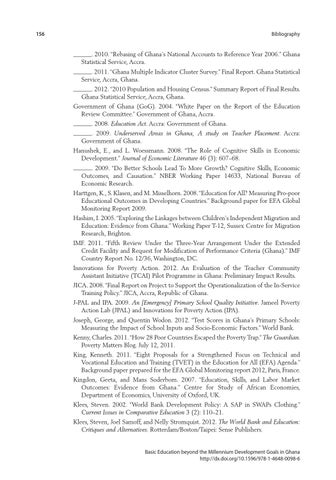156
Bibliography
. 2010. “Rebasing of Ghana’s National Accounts to Reference Year 2006.” Ghana Statistical Service, Accra. . 2011. “Ghana Multiple Indicator Cluster Survey.” Final Report. Ghana Statistical Service, Accra, Ghana. . 2012. “2010 Population and Housing Census.” Summary Report of Final Results. Ghana Statistical Service, Accra, Ghana. Government of Ghana (GoG). 2004. “White Paper on the Report of the Education Review Committee.” Government of Ghana, Accra. . 2008. Education Act. Accra: Government of Ghana. . 2009. Underserved Areas in Ghana, A study on Teacher Placement. Accra: Government of Ghana. Hanushek, E., and L. Woessmann. 2008. “The Role of Cognitive Skills in Economic Development.” Journal of Economic Literature 46 (3): 607–68. . 2009. “Do Better Schools Lead To More Growth? Cognitive Skills, Economic Outcomes, and Causation.” NBER Working Paper 14633, National Bureau of Economic Research. Harttgen, K., S. Klasen, and M. Misselhorn. 2008. “Education for All? Measuring Pro-poor Educational Outcomes in Developing Countries.” Background paper for EFA Global Monitoring Report 2009. Hashim, I. 2005. “Exploring the Linkages between Children’s Independent Migration and Education: Evidence from Ghana.” Working Paper T-12, Sussex Centre for Migration Research, Brighton. IMF. 2011. “Fifth Review Under the Three-Year Arrangement Under the Extended Credit Facility and Request for Modification of Performance Criteria (Ghana).” IMF Country Report No. 12/36, Washington, DC. Innovations for Poverty Action. 2012. An Evaluation of the Teacher Community Assistant Initiative (TCAI) Pilot Programme in Ghana: Preliminary Impact Results. JICA. 2008. “Final Report on Project to Support the Operationalization of the In-Service Training Policy.” JICA, Accra, Republic of Ghana. J-PAL and IPA. 2009. An [Emergency] Primary School Quality Initiative. Jameel Poverty Action Lab (JPAL) and Innovations for Poverty Action (IPA). Joseph, George, and Quentin Wodon. 2012. “Test Scores in Ghana’s Primary Schools: Measuring the Impact of School Inputs and Socio-Economic Factors.” World Bank. Kenny, Charles. 2011. “How 28 Poor Countries Escaped the Poverty Trap.” The Guardian. Poverty Matters Blog. July 12, 2011. King, Kenneth. 2011. “Eight Proposals for a Strengthened Focus on Technical and Vocational Education and Training (TVET) in the Education for All (EFA) Agenda.” Background paper prepared for the EFA Global Monitoring report 2012, Paris, France. Kingdon, Geeta, and Mans Soderbom. 2007. “Education, Skills, and Labor Market Outcomes: Evidence from Ghana.” Centre for Study of African Economies, Department of Economics, University of Oxford, UK. Klees, Steven. 2002. “World Bank Development Policy: A SAP in SWAPs Clothing.” Current Issues in Comparative Education 3 (2): 110–21. Klees, Steven, Joel Samoff, and Nelly Stromquist. 2012. The World Bank and Education: Critiques and Alternatives. Rotterdam/Boston/Taipei: Sense Publishers.
Basic Education beyond the Millennium Development Goals in Ghana http://dx.doi.org/10.1596/978-1-4648-0098-6
